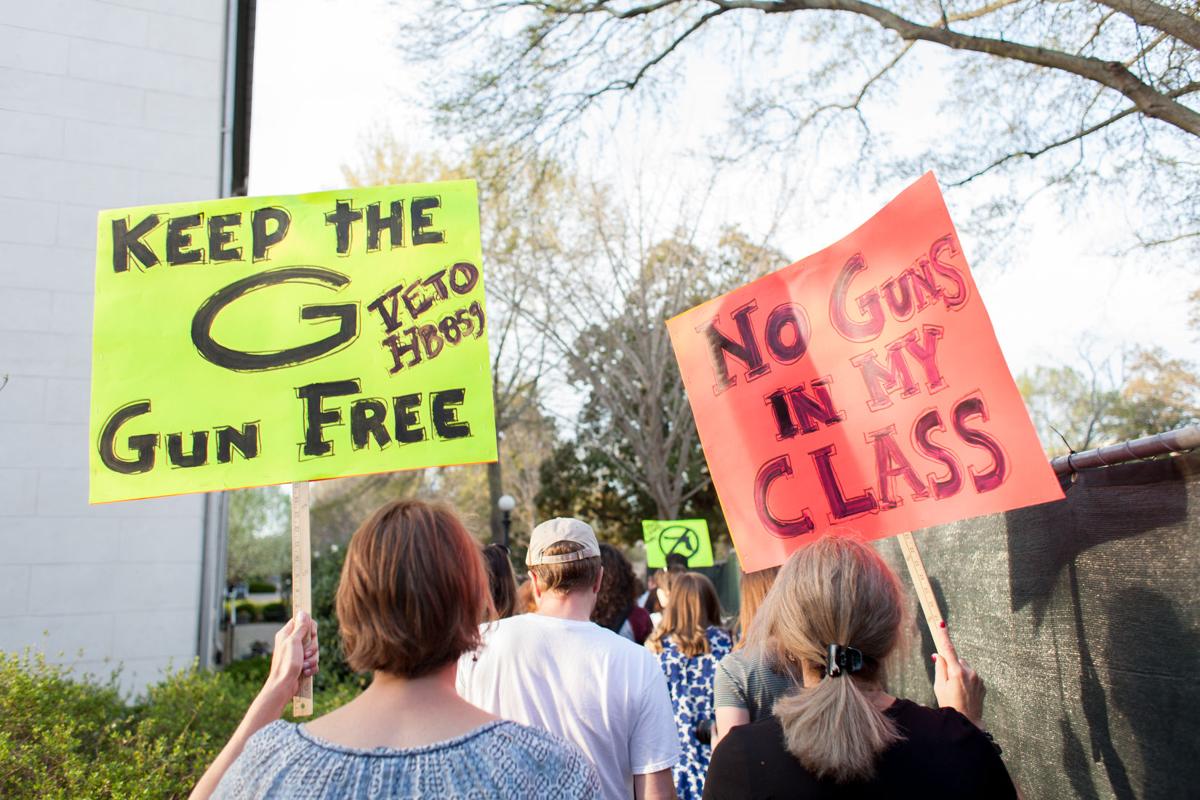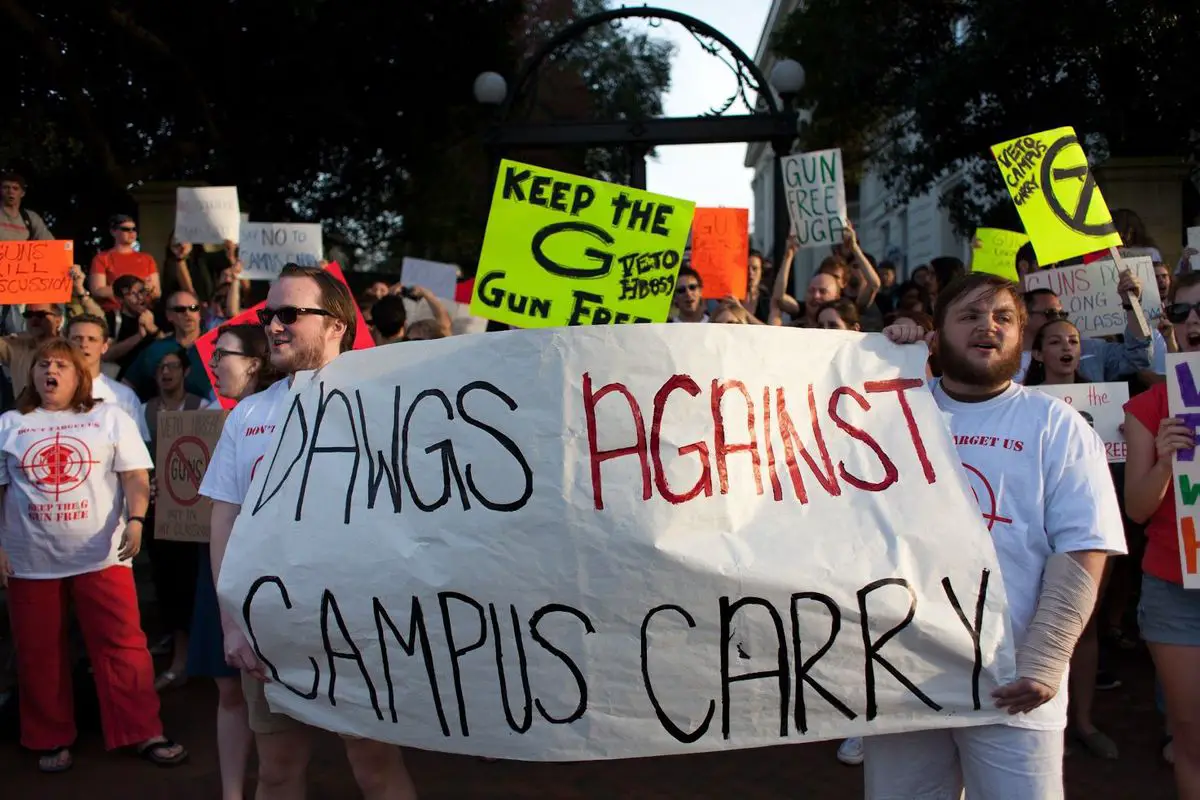Recently, the Georgia government passed the Campus Carry Bill, which goes into effect on July 1 and makes it legal for students to carry weapons on college campuses in the state. Considering that the world is on edge because of all the shootings and attacks that occur on a near daily basis, the bill doesn’t seem to be the wisest to pass. There was even a 2015 shooting at my own college in Savannah, Georgia. I remember how unsurprised I was because it felt like every college was bound to have at least one shooting. My thought was, “It was only a matter of time.”
Fortunately, no one was hurt, but now many eyebrows are being raised at the passing of the bill in a world where that sort of thinking is easily manifested, and in Georgia, nonetheless. Studies of violence in the South make the stereotype of the passionately Christian, gun-happy brand of Southerners hard to refute. With all the recent news headlines in mind, the Campus Carry Bill makes me and thousands of other college students in Georgia wonder how campus environments will change when the fall semester begins.
Before making assumptions and letting extreme caution take over our emotions, it’s important to understand the parameters that the bill is setting. At first glance, it’s easy to believe that all weapons will be allowed at all locations on every campus in Georgia, but that is not the case. For starters, the bill applies to only public colleges under the University of Georgia system. Private colleges, such as Emory University, are exempt from the bill. To carry a weapon on campus, the student must have a Georgia weapons license, which can be obtained at age twenty-one or over after passing a background check. Weapons are prohibited from “athletic venues, student housing, fraternity and sorority houses, faculty academic offices, offices where disciplinary proceedings are held, spaces where classes are held for high school students, including dual-enrollment programs, as well as preschool and childcare facilities.” Basically, they’re only allowed in buildings that have classrooms that don’t teach high schoolers, so it’s still pretty limited as to where weapons can be carried. Lastly, the weapons must be concealed.
The bill is a revision of a version that was vetoed by Governor Nathan Deal last year because he believed that campuses are “sensitive” areas that shouldn’t have any weapons. In the revision, lawmakers accommodated his requests to ban them from the most sensitive areas. Even though he didn’t want to pass a bill that made concealed weapons allowed on college campuses, the revision made it hard for him to veto in a state that’s primarily pro-gun. However, Deal mentioned with the total ban that students are a higher target because criminals know that they’re unarmed. His decision is already making Democrats eager to replace him.

Right off the bat, it’s easy to see how the Campus Carry Bill can backfire (no pun intended). Studies have shown that the southern region of the United States is more violent than any other region. A chart created by Duke sociologist Kieran Healy measures the number of assault deaths per one hundred thousand people over a ten-year span per region: South, West, Midwest and Northeast. The Midwest and Northeast stayed below the sixty thousand mark and the West briefly touched it around 2005-06. The South, however, remained over the seventy thousand mark for the entire decade, far above the other three regions.
In 1996, a UIUC psychology experiment tested the theory that Southerners were more violent than Northerners through a series of tests made to provoke subjects from both regions. Results showed that the Southerners’ cortisol level had a 79 percent raise, over twice as much as the Northerner’s 33 percent, meaning that the former group was angrier. The drastic difference is attributed to the South’s honor culture, which, in a nutshell, means putting one’s property and dignity over the law or consideration for other lives. Instead of settling conflicts in court or in a peaceful negotiation, it’s more honorable to fight it out, even if it means dying or killing someone else. The famous Hatfield and McCoy feud is a textbook example of this way of thinking.
These studies prove that statistically, ticking off a Southerner is probably not the best idea. It could just take one insult and a trigger-happy student for there to be an evacuation and several news crews at a college campus. Even if students have their licenses and can legally carry their weapons, it doesn’t mean that they won’t use it against another person; it just means that they passed the requirements to get their license.
On the other hand, the Campus Carry Bill could be seen as making campuses safer. In the unfortunate event that student and faculty lives are in danger, whether from a shooter or any other person who wishes to cause harm, those with weapons could defend themselves and the others whose safety is at risk.
Where I live and go to school, there are several military bases, with one practically right next to the campus. As a result, there are a lot of military students. The Campus Carry Bill might be an advantage for them since they would be allowed to carry their guns, though that is an area I don’t have too much knowledge on. However, those in the military enter with a vow to protect American citizens at all costs. So, having a military classmate with a gun on hand could be safer in the long run because of their purpose.
In the end, though, the air surrounding this new bill is tense. No one really knows whether it will make campuses safer or more dangerous. Perhaps nothing will change at all. With the requirement that the weapons need to be concealed, their might be a chance that they won’t be noticed at all.











That’s kind of scary , I hope they are responsible and sensible when carrying those weapons.
So if I am going to go shoot up a school, and its illegal to take my gun there, I will consider that legal consequence and stop when the legal consequences of planned multiple murder charges do not keep me from doing it?
So, a couple years in prison will keep me from doing something with a possible death or life without parole sentence?
A terribly biased article with notes of racism and stereotypes. Southerners are more violent? Because that’s where the blacks are, right August? If you’rr going to bring up the regional violence and blame it on religion and white southern culture, “passionately Christian, gun-happy brand of Southerners”, just go ahead and mention the racial demographic of the violence and at least get your facts straight by blaming the right skin colors, you racist.
I cannot even fathom being able to carry guns in school, especially where you live! Tempers run rampant down there! Be safe August! Great article!